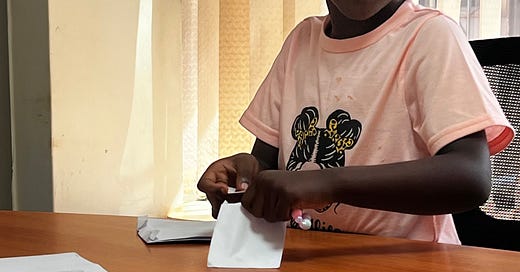Addressing Uganda's Housing Crisis: Incentivizing Investment Products for Children and Unlocking Long-Term Financing
June 23, 2025
Friends,
Two weeks ago, the "Grab a Coffee" podcast, run by Raymond and Simon, hosted the Governor of the Bank of Uganda in what was one of the best conversations I would recommend anyone to listen to on YouTube. The discussion covered a wide range of topics, knowledge, and plans he shared across different subjects. It was a really, really good conversation, especially when you consider the quality of the podcasts coming from Uganda; this was one of the best I have listened to.
The governor talked about various plans, especially for long-term financing, the financial market, and the capital markets plans that are coming to Uganda in the immediate near future and medium term.
Securities and Bonds coming to your market soon.
This includes the introduction of.
the diaspora bond,
the green bonds dedicated to raising finances for green and climate-focused projects,
and the Sukuk bonds dedicated to our brothers and sisters who Invest in only be Sharia-compliant products, allowing them to raise funds dedicated to those particular Sharia compliant projects.
Additionally, the infrastructure bonds, as we are seeing especially in our neighbor Kenya.
All of this is geared towards the government's continued improvement of capital market product offerings while also raising the local capital needed for various projects that require financing.
From my perspective, I can't wait for many of these initiatives; we have been advocating for, for some time now, and we have been hearing they are in the pipeline.
The next two to three years, and potentially five years, are going to be interesting for the capital markets. Such plans are extremely well thought out, and it was a pleasure to hear the governor highlight them in more detail.
The Critical Housing and Mortgage Crisis in Uganda
The governor also addressed the mortgage crisis in Uganda. For all who observe our capital market structure, financial landscape, and real estate sector, it is becoming increasingly challenging for young people to afford housing in this country.
The alternatives, which would have been mortgages from direct commercial banks, are very expensive. He discussed the challenge that these banks often have short-term deposits or short-term liabilities, which limits their ability to finance and fund mortgages, especially long-term ones.
When they access short-term liabilities in the form of deposits from customers (Me and You), they can only lend them out for short periods, which creates home loans (Medium term home loans) instead of the long-term mortgages that are needed.
The governor emphasized that we need to change our perspective; we need to unlock long-term liabilities that can help fund long-term assets. One of his immediate calls was to reform the pension sector, and rightly so. We have already stated that the pension sector has enormous potential to fund the capital-intensive mortgage industry at favorable rates over a long period. I won't repeat the governor's words; you can listen to that, and it would be beneficial.
Government’s pivotal role and the Children’s Investment Plans’ roles in building a Mortgage Sector
However, I also wanted to add something, knowing my article is often read by the governor and various people in policy positions.
Another way we can unlock long-term mortgage financing is through the introduction or creation of products that encourage parents to save and invest for their children, creating incentives for that.
For example, in different countries, there are specific financial products designed for children under 18 years that are tax-free.
We might create products or treasury bonds or securities specifically for children. If a child invests in these, any income they generate would be completely tax-free. This would encourage parents to invest in these products to ensure their children receive tax-free compounded investments growing their trust funds.
It would motivate more parents to save and invest for their children's futures. This is one way to unlock long-term financing that can support the mortgage industry in Uganda.
As a parent, I think if I have a million Ugandan shillings to invest for my child, and it attracts 14-16% per annum tax-free, all I have to do is leave it there for 15 years. By the time my child is 15 or 20 years old, they can access that money without any tax implications.
With so many other incentives, the government has the power to create incentives that can encourage and stimulate parents to invest in the name of their children in long-term products without withdrawing that money.
This can be a source of capital that can finance mortgages, eliminating the need for the government to borrow. Suddenly, you can access a significant amount of capital to deploy for long-term success, using that capital to finance mortgages.
By the time the children are of age to access that money for other products or for education funds to take them to university, that capital would have been available for 10-15 years.
This means that for every 10 children, we can fund one mortgage unit, creating a ripple effect.
This approach creates a product that we desperately need right now, ensuring the future of our children. It allows patient capital and patient liabilities to come in, funding long-term assets and unlocking the mortgage industry in Uganda.
Otherwise, what we currently have is leaving many people behind. We are witnessing many young people growing old without a chance to own a home because it is becoming extremely expensive.
By leaving it to the private sector, we risk developing slums. This is why we see young people purchasing very small plots of land, just two or three decimals, and constructing simple structures. The government and policymakers need to think long-term about how to unlock patient capital that can fund the mortgage industry. Access to affordable, quality housing is a right for all of us.







Well stipulated Comrade 🫡🫡🫡
Great idea. How can i do this to my child?